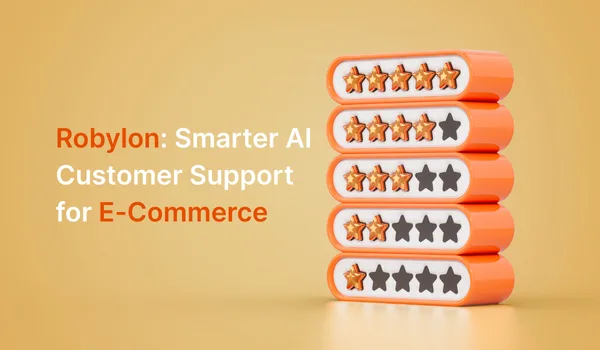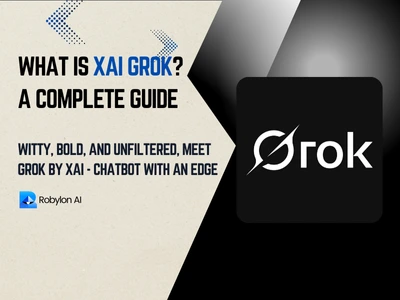TL;DR
In this guide, we will walk through the 12 most powerful Zendesk alternatives in 2025, comparing features, pricing, pros and cons, and the specific business use cases each one serves best.
- Robylon AI → AI-first platform; automates 80%+ queries across chat, voice, email & social with sentiment analytics; best for E-commerce, Fintech, SaaS, Crypto, Gaming.
- Freshdesk → Great for SMBs; 700+ integrations; Freddy AI for voice; strong omnichannel support at a lower price.
- Help Scout → Simple, email-like shared inbox; fast onboarding; affordable flat-rate pricing; great for startups & SMBs.
- Zoho Desk → Budget-friendly; integrates with Zoho ecosystem & 200+ apps; Zia AI for sentiment & tagging; free plan available.
- Intercom → Chat-first, engagement-driven; Fin AI agent + Copilot; blends support + sales + marketing in one.
- HubSpot Service Hub → Best for teams already using HubSpot; CRM + marketing + support unified; free plan; customer health scoring.
- Gorgias → E-commerce-focused (Shopify, Magento, BigCommerce); order edits, refunds, and inventory from inside helpdesk; revenue tracking.
- Jira Service Management → ITSM & DevOps focus; incident/change management; asset tracking; tight Jira/Confluence integration.
- Salesforce Service Cloud → Enterprise-grade; Einstein AI; field service tools; deep customization; scales for complex orgs.
- Front → Shared inbox and collaboration; email-like UI; internal tagging & comments; strong for cross-department teams.
- Kustomer → Unified customer timeline view; strong AI + automation; deep ecommerce integrations; higher starting price.
- Desk365 → Lightweight, affordable (~$12/agent); Slack/MS Teams integration; quick setup for lean teams.
Introduction
Back in the early 2010s, Zendesk quickly became the go-to solution for companies setting up their first help desk. Its clean interface, broad feature set, and ability to scale made it the “default” choice for growing businesses. Fast forward to 2025, and the landscape looks very different. Customer expectations have shifted toward AI-first experiences, true omnichannel support, and cost efficiency. What once felt like a safe bet is now being questioned by teams of every size.
Today, many SMBs, startups, and enterprises are actively looking for Zendesk competitors or even a complete Zendesk replacement in 2025. The reasons are consistent
- Pricing has crept higher, with per-agent costs becoming unsustainable for lean teams.
- Complexity in workflows often slows adoption and frustrates support agents.
- Support experience itself has drawn criticism, with slower response times and limited personalization compared to modern platforms.
If you’d like to explore how AI-driven automation can handle 80% of repetitive tickets and cut response times by 90%, book a demo with Robylon.
How to Pick a Zendesk Alternative
Switching help desk software can feel daunting, but it doesn’t have to be. The best way to choose the best Zendesk alternatives is to consider a few key factors and align them with your business objectives. Think of it as a checklist that helps you compare each Zendesk competitor side by side, so you can make an informed decision.
Here are six key criteria to evaluate when exploring a Zendesk replacement
1. Ticketing system strength
Look for a robust Zendesk ticketing alternative that converts emails to tickets, manages multiple conversations in one place, and offers SLA tracking. If your team handles thousands of tickets per month, efficiency here will save hours.
2. Omnichannel support
Modern customer service is not limited to email. Ensure the platform supports a shared inbox, live chat widgets, and WhatsApp or voice support. A true omnichannel help desk keeps all conversations unified and seamless. “If you’re exploring which platforms to prioritize, check out our detailed guide on the most effective customer service channels.
3. AI-driven help desk
More teams are moving toward an AI help desk that includes chatbots, ticket automation, and self-learning workflows. AI can deflect repetitive questions and free agents for complex cases. Curious about no-cost solutions for managing support tickets? Here's a comprehensive guide to the best free help desk software in 2025
4. Knowledge base integration
A strong knowledge base + ticketing system allows customers to self-serve through FAQs or a self-service portal, reducing ticket load.
5. Scalability
If you run multiple brands or have IT needs, software with multi-brand support and ITSM features, such as Jira Service Management or ServiceNow, is preferable. Enterprises should check both compliance and security layers.
6. Pricing & trials
Compare Zendesk pricing alternatives carefully. Some tools are cheaper than Zendesk, others offer a free Zendesk alternative with limited features, and many provide trials to test before committing. Always factor in hidden costs like add-ons or training.
Different businesses will weigh these factors differently. SMBs often prioritize affordability, ecommerce teams care about Shopify or marketplace integrations, and IT teams need strong service management features.
11 Alternatives for Zendesk in 2025
1. Robylon AI For AI-First, Omnichannel Support
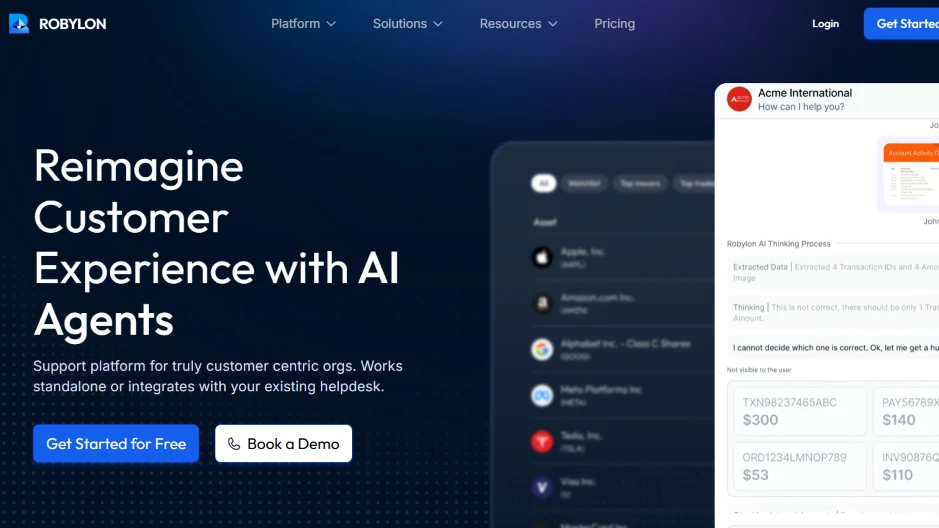
Best for: Fast-growing e-commerce, fintech, SaaS, and travel companies that want to automate up to 80% of customer queries across chat, voice, email, and social channels without losing the human touch.
Key Features: Robylon is an AI agent platform built for speed and scale. It integrates with 40+ platforms (Freshdesk, Zendesk, Intercom, WhatsApp, Shopify, Zoho, Salesforce, and more) to unify customer conversations. Core capabilities include
- AI Agents for chat, email, and voice with multilingual support.
- Workflow automation that connects directly to CRMs, ERPs, and payment systems.
- Sentiment-aware conversations with metrics like Net Sentiment Score (NSS) and Sentiment Shift Score (SSS) to track customer experience in real time.
- An insights layer that highlights unresolved queries, AI vs. human resolution, and agent productivity.
Notable Limitations: Robylon is not positioned as a legacy ticketing tool; enterprises needing deep ITSM may find it less suited.
Starting Price: $39/month (self-serve plan); Enterprise plans available with custom AI voice/chat deployment.
Why it beats Zendesk: Unlike Zendesk’s ticket-first model, Robylon offers AI-first, agentic workflows that resolve queries instantly, cut handle time by 90%, and reduce support costs by over 30%. It’s built for companies that want scalable automation, not just another help desk.
This positioning makes Robylon stand out because
- It owns the “AI-first alternative” space (while others are ticketing-first).
- It uses metrics (80% deflection, 90% faster resolution, 30% cost savings) that you have already validated.
- It’s verticalized (fintech, e-commerce, SaaS, travel), unlike generic players.
2. Freshdesk – SMB-Focused
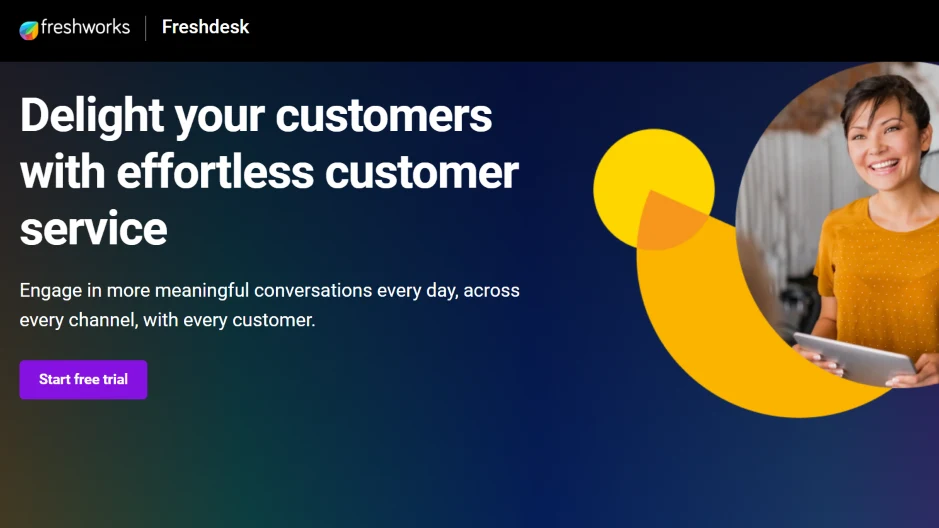
Best for: Small to mid-sized businesses (SMBs) need affordable omnichannel support with strong integrations.
Key Features: Freshdesk offers a robust Zendesk alternative with email-to-ticket conversion, a shared inbox, and native omnichannel support (including chat, social, phone, and WhatsApp). It's Freddy AI, which automates ticket routing, provides AI-powered responses, and even assists with knowledge base creation.
Notable Limitations: The interface can feel overwhelming for large enterprises. Limited advanced customization compared to Zendesk.
Starting Price: Free plan (up to 2 agents); paid plans from $15/agent/month.
Why it beats Zendesk: Freshdesk delivers the less pricing alternatives with intuitive workflows and a faster learning curve. For growing SMBs, it’s one of the top Zendesk alternatives 2025 that balances cost, integrations, and automation.
3. Help Scout – Simplicity and Startups
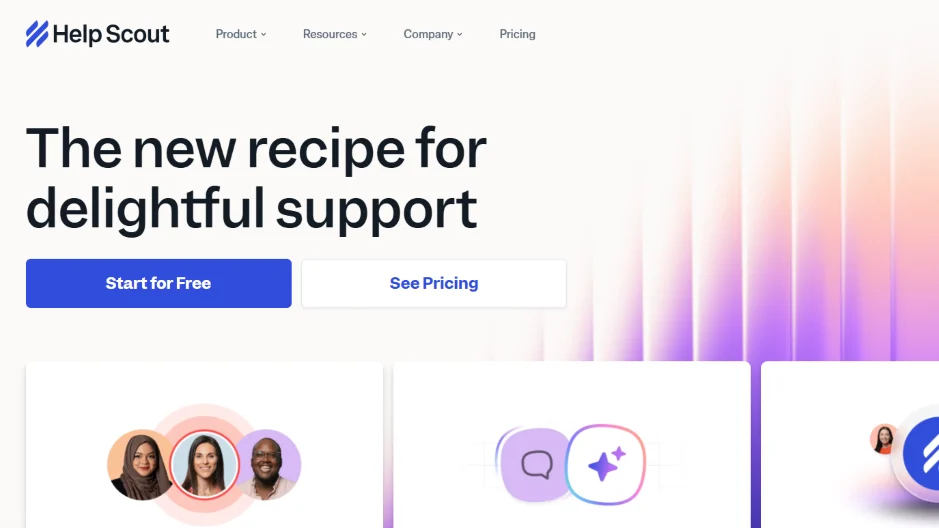
Best for: SMBs and startups seeking affordable, email-style customer support with minimal set-up.
Key Features: Help Scout delivers a shared inbox that feels like email but with collaboration tools like notes, tags, and saved replies. It includes live chat via a built-in knowledge base and self-service portal, and workflow automation to handle repetitive tasks. Reporting and CSAT surveys are simple to configure and easy to read.
Notable Limitations: Limited customization and fewer integrations
Starting Price: Free plan available; paid plan from $25/user/month.
Why it beats Zendesk: Help Scout simplifies support without enterprise bloat. It’s easier to learn, cheaper than Zendesk, and ideal for fast-growing small teams.
4. Zoho Desk – Budget-Friendly with Multi-Tool Integration
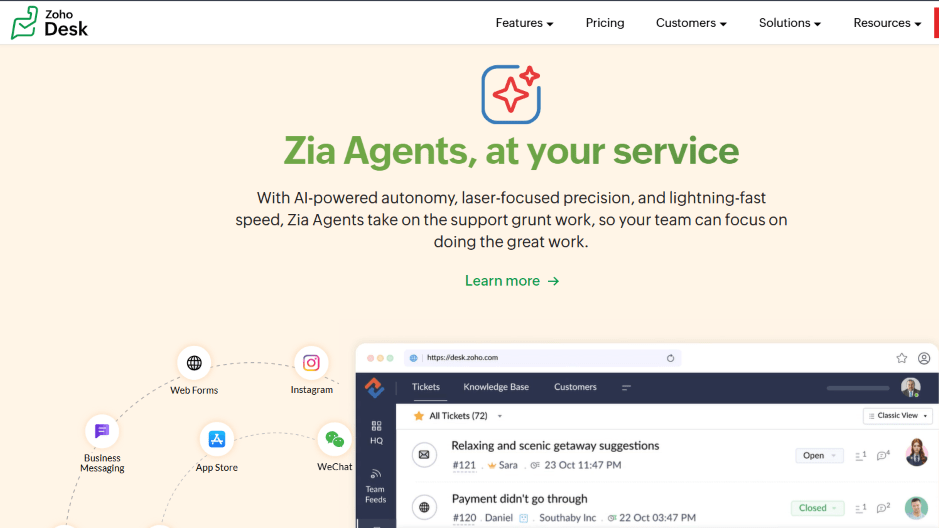
Best for: Budget-conscious teams, SMBs, and companies already using the Zoho ecosystem.
Key Features: Zoho Desk offers multichannel ticketing (email, chat, phone, social), workflow automation, and SLA management. Its Zia AI assistant powers sentiment analysis, ticket tagging, and knowledge base suggestions. It integrates seamlessly with Zoho CRM and 200+ third-party apps, making it highly versatile.
Notable Limitations: The interface has a learning curve, and advanced customization can feel less intuitive than Zendesk.
Starting Price: Free plan; paid plans from $7/agent/month.
Why it beats Zendesk for affordability: Zoho Desk is significantly cheaper than Zendesk while offering strong automation, AI-driven insights, and smooth migration.
5. Intercom – AI-Driven Chat and Engagement
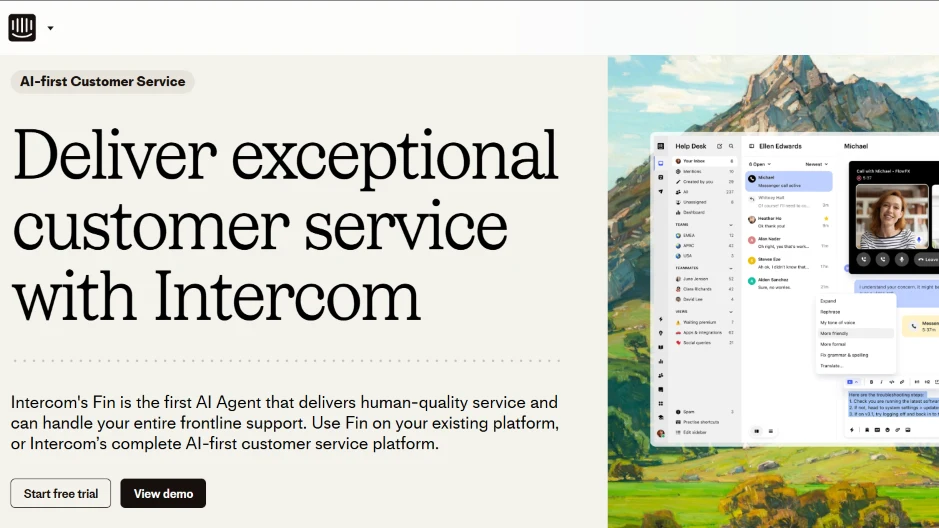
Best for: SaaS, tech, and e-commerce companies that want an AI-powered chat support blend with customer engagement and sales tools.
Key Features: Intercom offers a messaging-first Zendesk competitor with in-app chat, email, and social integrations. Businesses can run onboarding flows, product tours, proactive campaigns, and collect customer feedback all in one platform.
Notable Limitations: Pricing can rise with add-ons, and workflow customization is less flexible than Zendesk.
Starting Price: From $39/seat/month, plus $0.99 per AI resolution.
Why it beats Zendesk for engagement: Intercom provides advanced conversational AI and proactive outreach features that Zendesk lacks, making it a strong Zendesk replacement for chat-heavy teams.
6. HubSpot Service Hub – All-in-One CRM + Support
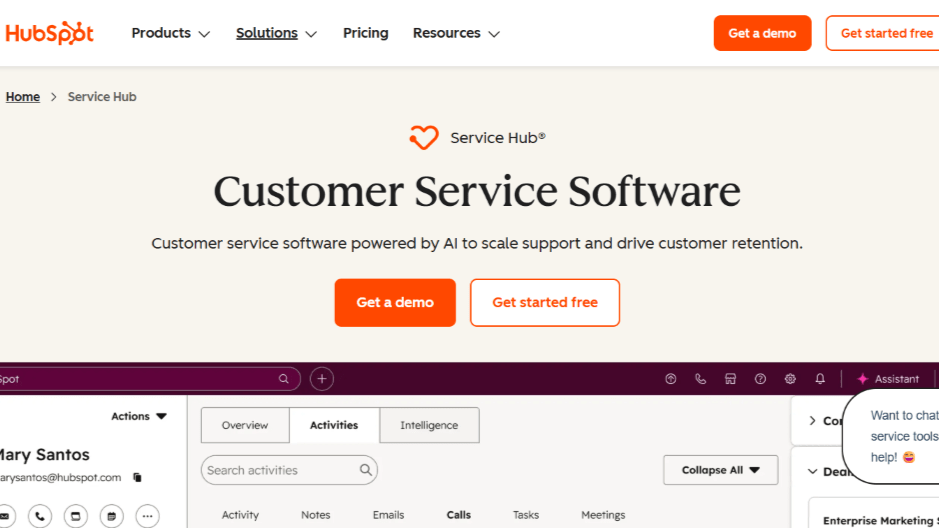
Best for: Businesses already using HubSpot CRM or teams wanting unified sales, marketing, and support in one platform.
Key Features: HubSpot Service Hub integrates seamlessly with the broader HubSpot ecosystem, combining ticketing, live chat, knowledge base, customer portals, and automation. It enables contextual support by pulling sales and marketing history into the support inbox, giving agents a complete view of each customer. Built-in surveys, reporting, and SLA tools strengthen customer success workflows.
Notable Limitations: Can be expensive as advanced features unlock only in higher-tier plans; less flexible customization.
Starting Price: Free plan available; paid plans start at $20/seat/month.
Why it beats Zendesk for CRM integration: Unlike Zendesk Sell, HubSpot offers a truly unified CRM + support solution, making it a strong Zendesk replacement for sales-led organizations.
7. Gorgias – Ecommerce Support
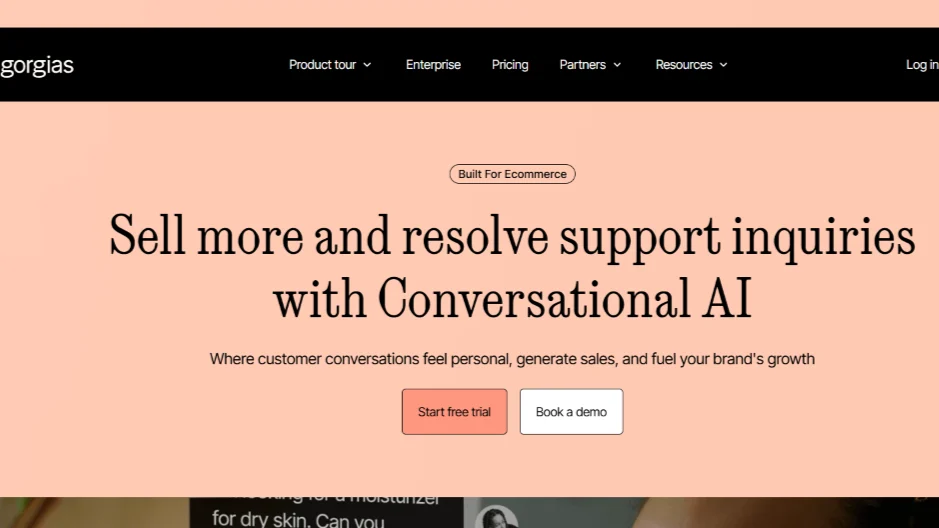
Best for: E-commerce brands (Shopify, Magento, BigCommerce) need deep store integrations and ticket-volume pricing.
Key Features: Gorgias is an ecommerce-first Zendesk alternative that unifies email, chat, SMS, WhatsApp, and social messages into one inbox. It integrates natively with Shopify and Magento, allowing agents to process refunds, cancellations, and order edits directly within the helpdesk. Its AI features automate FAQs like order status, while built-in revenue tracking shows the sales impact of customer support.
Notable Limitations: More limited outside e-commerce uses, with basic reporting compared to Zendesk.
Starting Price: From $10/month (50 tickets), usage-based pricing thereafter.
Why it beats Zendesk for ecommerce: Unlike Zendesk, Gorgias is purpose-built for online stores, offering real-time order management and Shopify automation that boost both support efficiency and sales.
8. Jira Service Management – ITSM and Technical Support
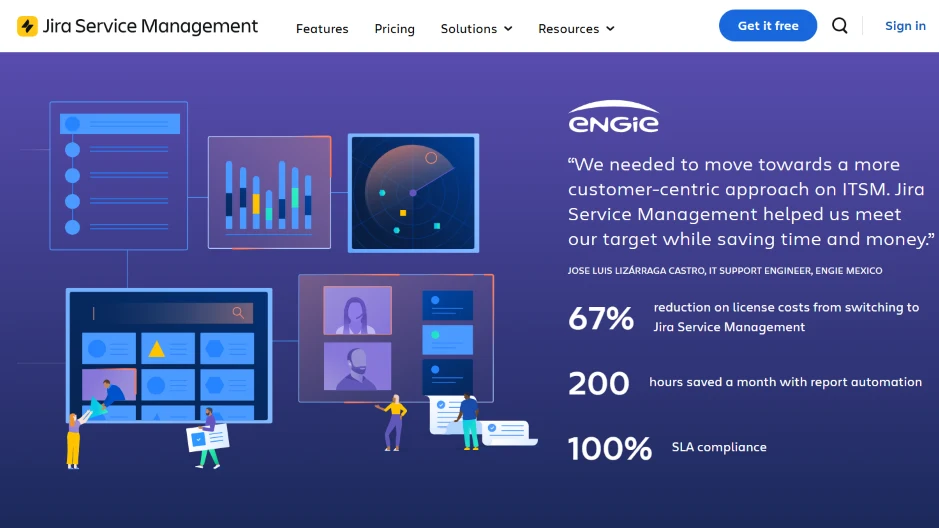
Best for: IT teams, DevOps, and enterprises that need advanced IT service management (ITSM) capabilities.
Key Features: Atlassian’s Jira Service Management combines robust ticketing with ITIL workflows, asset management, and SLA tracking. Teams can manage incidents, problems, and change requests while linking directly to Jira Software issues. AI features summarize tickets, suggest routing, and detect patterns across incidents. Native integrations with Confluence strengthen knowledge management, and 600+ templates speed-up IT workflow setup.
Notable Limitations: Steeper learning curve than Zendesk, and fewer third-party integrations beyond the Atlassian ecosystem.
Starting Price: Free plan (up to 3 agents); paid plans from ~$22/agent/month.
Why it beats Zendesk for IT support: Zendesk is customer-first, but Jira Service Management is purpose-built for ITSM and DevOps teams, offering deeper workflows, asset tracking, and compliance controls.
9. Salesforce Service Cloud – Enterprise-Grade Support
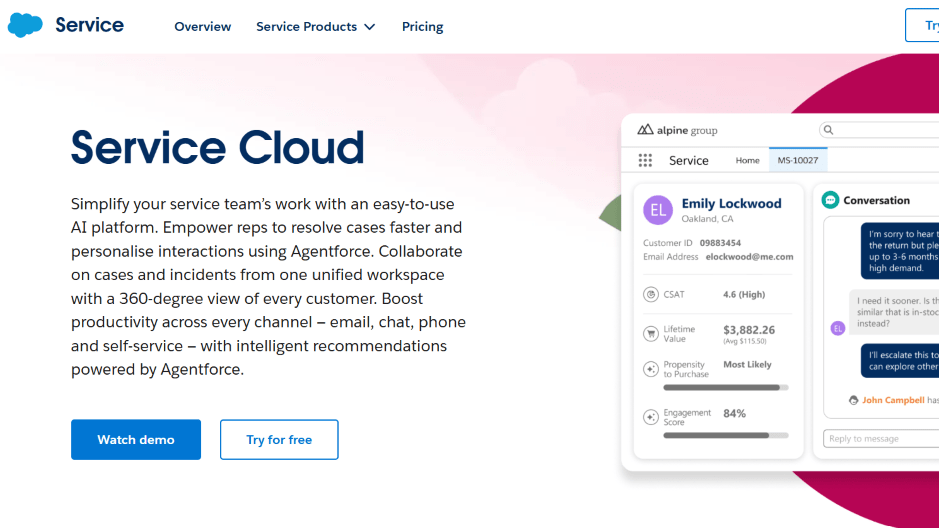
Best for: Large enterprises and organizations with complex support workflows need scale, deep customization, and advanced analytics.
Key Features: Salesforce Service Cloud integrates directly with Salesforce CRM, giving agents a 360° customer view across sales, service, and marketing. It offers omnichannel routing (email, phone, chat, social), Einstein AI for predictive insights, and field service management for dispatch and on-site support. Teams can also convert conversations into knowledge base articles and leverage advanced reporting dashboards.
Notable Limitations: Higher cost compared to most Zendesk competitors; implementation can be complex.
Starting Price: From $25/user/month; enterprise editions scale up to $330+/user/month.
Why it beats Zendesk for enterprises: Salesforce delivers enterprise-grade scalability, AI-driven insights, and end-to-end CRM integration, making it a stronger choice than Zendesk for global, high-volume teams.
10. Front – Team Collaboration and Shared Inboxes
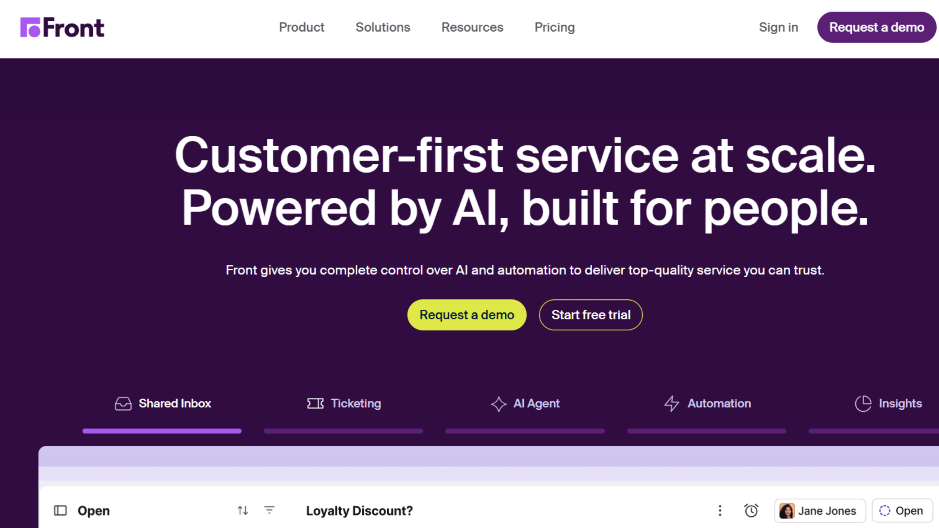
Best for: Teams that rely on shared inbox collaboration, in B2B industries, SaaS, logistics, and financial services.
Key Features: Front combines email, chat, SMS, and social channels into one shared inbox with an email-like interface. Agents can tag teammates, leave internal comments, and track SLAs. With integrations and workflow automation, teams can streamline handoffs and reduce duplicate work.
Notable Limitations: Reporting and analytics are more limited than Zendesk. Entry plan requires a 10-seat minimum.
Starting Price: From $29/seat/month (Starter plan).
Why it beats Zendesk for collaboration: Front is built for team-based service, not just ticketing, making it a powerful shared inbox alternative to Zendesk for companies where multiple departments need to work together on customer requests.
11. Kustomer – CRM-Style Support and Personalization
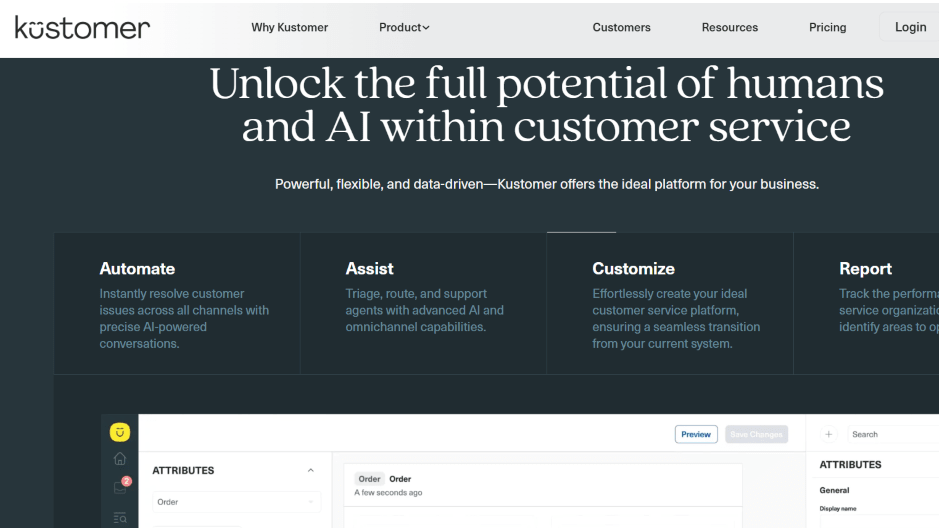
Best for: Mid-market and enterprise teams, e-commerce and retail, that need deep personalization and a 360° customer view.
Key Features: Kustomer organizes every interaction into a unified customer timeline, so agents don’t jump between tabs. Its AI (KIQ) automates repetitive workflows, handles sentiment analysis, and can even process refunds or update orders when integrated with Shopify or BigCommerce. Advanced automation sequences, omnichannel messaging (email, chat, SMS, social, and voice), and flexible API-driven customizations make it a modern Zendesk replacement.
Notable Limitations: Pricing is on the higher side, and some reporting features are less customizable.
Starting Price: $89/agent/month (Enterprise plan).
Why it beats Zendesk: Kustomer prioritizes the customer journey over tickets, offering e-commerce integrations and AI-driven personalization that Zendesk struggles to match.
12. Desk365 – Fast, AI-First Adoption
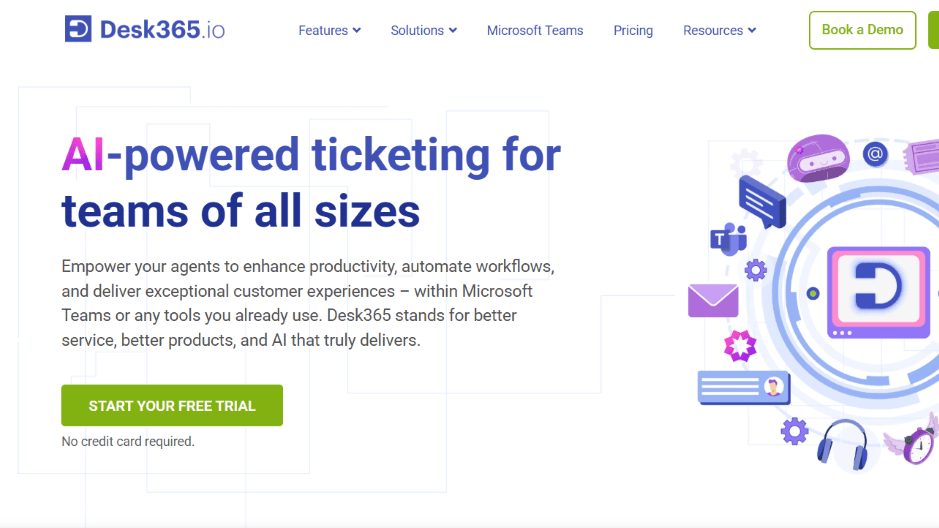
Best for: SMBs and startups need a simple, affordable, cloud-native help desk with AI automation baked in.
Key Features: Desk365 offers a modern shared inbox, omnichannel ticketing, and a self-service knowledge base at an accessible price. AI features assist with auto-tagging, routing, and canned responses. Teams can set up automation rules, SLA tracking, and workflows quickly, making adoption far faster than Zendesk’s more complex setup.
Notable Limitations: Lacks enterprise-grade customization and advanced AI features found in Intercom or Salesforce Service Cloud.
Starting Price: Around $12/agent/month.
Why it beats Zendesk: Desk365 is designed for fast onboarding and affordability, making it ideal for smaller teams frustrated by Zendesk’s high costs and steep learning curve.
Zendesk Alternatives in 2025: Quick Comparison
Looking for a Zendesk replacement? Here’s the short version
Conclusion: Zendesk Alternatives in 2025
Zendesk may have been the default help desk a decade ago, but in 2025, rising costs, complexity, and lagging personalization have teams actively searching for alternatives. This guide compares 12 of the most powerful Zendesk competitors for features, pricing, pros/cons, and best-fit use cases.
Robylon AI leads with an AI-first approach, automating over 80% queries across chat, email, voice, and social with real-time sentiment analytics; ideal for SaaS, fintech, travel, and e-commerce. Freshdesk appeals to SMBs with 700+ integrations and Freddy AI at a lower price point, while Help Scout offers a simple, email-like inbox with flat-rate pricing for startups. Zoho Desk provides budget-friendly automation and tight Zoho ecosystem integration.
Intercom focuses on AI-driven engagement, HubSpot Service Hub unifies CRM and support, and Gorgias is tailored to e-commerce with revenue tracking and Shopify-native workflows. For ITSM, Jira Service Management excels with asset tracking, while Salesforce Service Cloud scales enterprise-grade support with Einstein AI. Front improves team collaboration, Kustomer personalizes journeys via unified timelines, and Desk365 serves lean teams with affordable, AI-powered ticketing.
Each platform addresses unique needs, making 2025 the right time to rethink support systems.
FAQs
Which Zendesk competitor is best for IT teams?
Jira Service Management is the top choice for IT and DevOps teams. It offers ITIL workflows, asset management, incident/change tracking, and tight integration with Jira and Confluence capabilities that go far beyond standard customer service tools.
Which platform is best for e-commerce support?
Gorgias is purpose-built for e-commerce brands. It integrates with Shopify, Magento, and BigCommerce, allowing agents to process refunds, order edits, and inventory checks directly within the helpdesk. It also tracks revenue generated from support interactions.
What is the most budget-friendly alternative to Zendesk?
Zoho Desk offers the most affordable plans, starting from around $7/agent/month, with a free version available. It integrates seamlessly with the Zoho ecosystem and over 200 third-party apps, making it cost-effective for SMBs and startups.
Which Zendesk alternative is best for AI-driven automation?
Robylon AI stands out as the strongest AI-first alternative. It automates over 80% of customer queries across chat, voice, email, and social, with real-time sentiment analytics and 2-second response latency; ideal for SaaS, e-commerce, fintech, and travel companies.
Why are companies looking for Zendesk alternatives in 2025?
Zendesk’s rising pricing, complex workflows, and slower adoption have led many teams to explore alternatives. Modern businesses now expect AI-first automation, omnichannel support, and cost efficiency features, where newer platforms often outperform Zendesk.

.png)





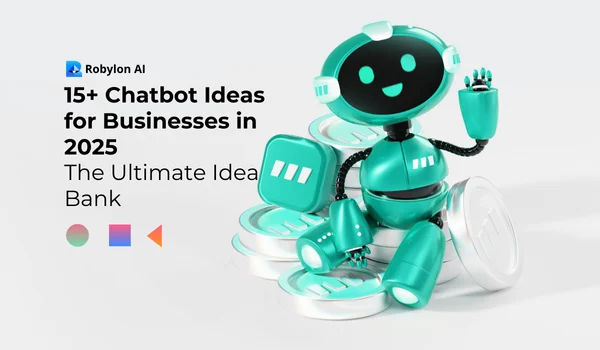
.webp)
.webp)
